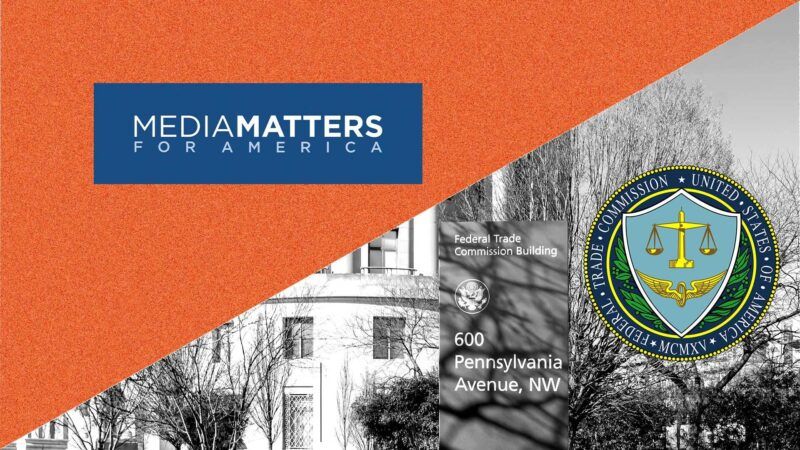Advertising Companies Cave to the FTC. Media Matters Sues To Defend the First Amendment.
Omnicom Group and the Interpublic Group of Companies accepted the Federal Trade Commission's anti-boycott proviso to complete their merger. Instead of capitulating to the commission, Media Matters is suing.

On Monday, Andrew Ferguson, chair of the Federal Trade Commission (FTC), announced that his agency had reached a settlement with Omnicom Group and Interpublic Group of Companies (IPG), two of the largest advertising holding companies that had been targeted by the FTC's recent advertiser boycott antitrust investigation. With the FTC's investigation into these advertising companies now over, the firms can now merge.
Still, the legal battle between the commission and Media Matters for America, a nonprofit media watchdog included in the agency's boycott investigation, has just begun. On Monday, Media Matters, which has been accused by X Corp. of orchestrating an advertiser boycott of the platform, filed a lawsuit challenging the FTC's ongoing investigation into the nonprofit on First Amendment grounds.
The FTC's proposed consent order to the merger of the two advertising holding companies prohibits Omnicom and IPG from "entering into or maintaining any agreement or practice that would steer advertising dollars away from publishers based on their political or ideological viewpoints," according to Ferguson. The "settlement does not limit either advertisers' or marketing companies' constitutionally protected right to free speech," added the chairman.
Ari Cohn, tech policy lead counsel for the Foundation for Individual Rights and Expression, challenges Ferguson's assertion, telling Reason that "prohibiting the carrying out or enactment of editorial discretion absolutely limits First Amendment activity." Cohn says Ferguson "seems to believe that he can magically turn something into 'not speech' just by calling it something different. But he couldn't be more wrong."
As part of its advertising boycott lawsuit, the FTC is also investigating Media Matters for its role in facilitating an alleged boycott against X Corp. In 2023, Elon Musk sued Media Matters for allegedly disparaging the platform and prompting an advertising boycott. X Corp.'s case against Media Matters is ongoing; now the nonprofit is challenging the FTC's investigation into its role in the alleged advertiser boycott.
X Corp. sued Media Matters after the nonprofit reported that "X was permitting advertisements to be placed next to pro-Nazi or other extremist content," such as "an advertisement for Oracle appearing next to an image [and quote] of Adolf Hitler," per Media Matters' Monday complaint.
X Corp.'s lawsuit was followed by two separate investigations opened by the attorneys general of Texas, which filed suit the same day Musk did (November 20, 2023), and Missouri, which filed suit in March 2024. Both were shut down by the U.S. District Court for the District of Columbia, which ruled that Media Matters' speech was protected by the First Amendment. In the Texas case, the Court of Appeals for the D.C. Circuit said that "Texas's 'contention that [Media Matters'] conduct is not constitutionally protected…is utterly devoid of evidence to support such a claim.'"
Undeterred by federal courts striking down lawsuits on Media Matters' reporting, the FTC issued a sweeping civil investigative demand (CID) to the nonprofit in May that probes the nonprofit's finances, editorial process, newsgathering activities, and affiliations. Media Matters argues that the commission's CID falls outside the scope of its authority by failing to "identify the relevant 'conduct' or 'alleged violation' that the FTC is pursuing."
Even if the FTC were pursuing its investigation properly, Media Matters cites National Federation of the Blind v. FTC (2005) as evidence that the commission may not enforce antitrust laws against Media Matters. In this case, the 4th Circuit Court of Appeals found that "non-profit organizations fall outside the scope of the agency's [antitrust] jurisdiction," as the Federal Trade Commission Act only affords the commission jurisdiction "over 'persons, partnerships, or corporations,' [and] an entity is only a 'corporation,' [if it is] organized to carry on business for its own profit or that of its members.'" Media Matters is a nonprofit.
Supreme Court precedent also shields boycotts—whether conducted by nonprofit organizations or otherwise—from prosecution under the antitrust laws. The Court ruled in NAACP v. Claiborne (1982) that the First Amendment protects politically motivated boycotts.
If it is the case that Media Matters intends to unreasonably narrow the window of acceptable speech by promoting the boycotting of certain platforms, the public can respond by boycotting brands that employ the services of advertising groups that cite Media Matters. Such a boycott would be politically motivated economic collusion—the very kind for which the FTC is investigating Media Matters.
In both cases, such boycotts are protected by the First Amendment. While Ferguson might allege that the behavior of Media Matters and advertisers may be stifling public debate, members of the alleged boycott are not "violating the law" through their participation. Instead, Media Matters argues, it is the FTC itself that is violating the law by investigating it for First Amendment-protected speech.
